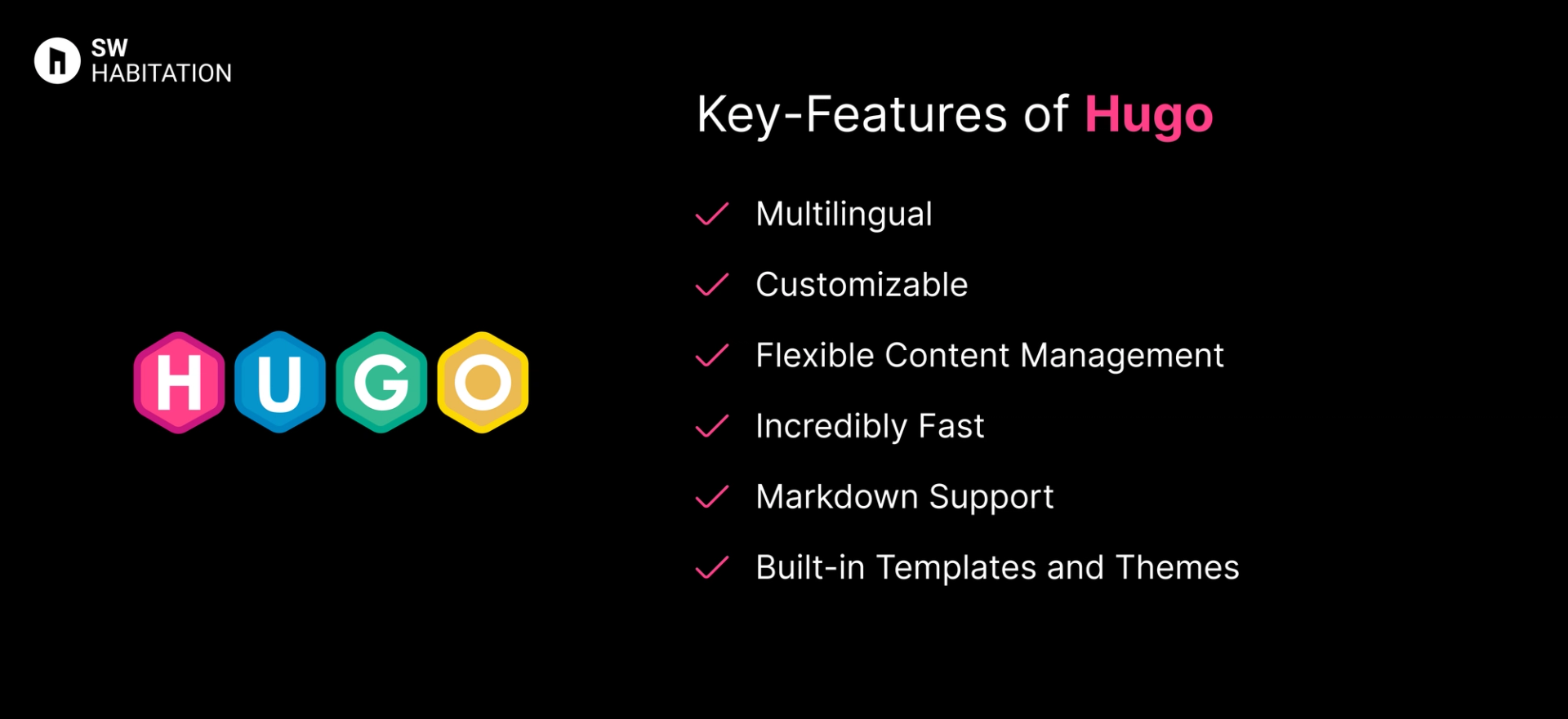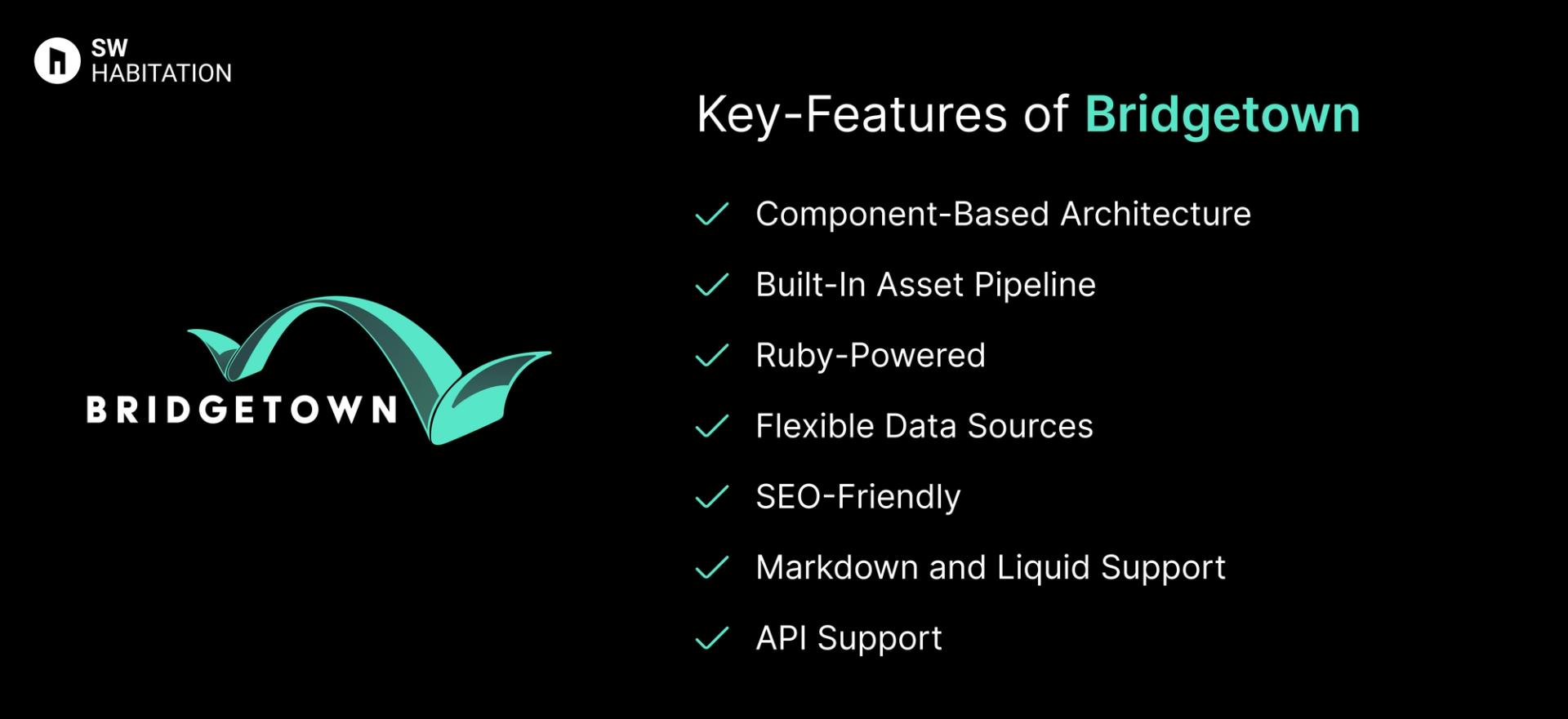Hugo vs. Bridgetown

Hugo

Bridgetown
Have you ever been to a website that loads super fast? Chances are it uses an SSG (Static Site Generator). It’s a tool that builds your site ahead of time, so when someone visits, they get the page instantly. No waiting around for things to load it’s just there.
What is Hugo?
Hugo is an open-source static site generator written in Go. It’s famous for its speed, being one of the fastest generators available, even with large websites.
Hugo uses Markdown files for content and allows you to customize your site with themes and templates. It’s simple, powerful, and perfect for those who want quick deployment with minimal setup.
Key Features of Hugo


- Multilingual: Easy setup for multi-language websites.
- Customizable: Plenty of configuration options to meet your needs.
- Flexible Content Management: Supports pages, posts, and taxonomies like tags and categories.
- Incredibly Fast: Hugo can generate thousands of pages in just a second.
- Markdown Support: Write in Markdown and Hugo will handle the rest.
- Built-in Templates and Themes: Use or create custom themes for fast and efficient development.
Advantages of Hugo
- Huge Community: With tons of themes, plugins, and community resources.
- Lightweight: Minimal dependencies required, which means less complexity.
- Full Flexibility: Create custom templates or use pre-built themes.
- Multilingual Sites: It’s a breeze to create websites in multiple languages.
- Super Speed: Hugo is one of the fastest static site generators available.
Disadvantages of Hugo
- Limited Plugins: While it has a good set, Hugo’s plugin ecosystem is not as huge as others like Gatsby.
- Requires Go Installation: You’ll need Go installed on your system, which could be a barrier for some users.
- Learning Curve for New Users: It can be challenging for beginners who aren’t familiar with the command line.
What is Bridgetown ?
Bridgetown is a static site generator built with Ruby.
It is designed to help developers create fast, modern websites with ease. It’s often seen as the spiritual successor to jekyll, with a fresh take on static site generation. Bridgetown combines the power of Ruby with a modern development workflow, supporting things like webpack, dynamic content with APIs, and flexible templating options.
Key Features of Bridgetown


- Component-Based Architecture: It supports reusable components for cleaner code.
- Built-In Asset Pipeline: It integrates with webpack for managing assets like CSS and JavaScript.
- Ruby-Powered: It leverages the simplicity and power of Ruby.
- Flexible Data Sources: It pull content from YAML, JSON, CSV, or external APIs.
- SEO-Friendly: It generates clean, semantic HTML with built-in SEO optimisations.
- Markdown and Liquid Support: It writes content in Markdown and use liquid for templating.
- API Support: It fetches dynamic content from APIs while keeping the site static.
Advantages of Bridgetown
- Extensible: Custom plugins and extensions for advanced use cases.
- Fast and Lightweight: Generates static HTML for quick load times.
- Great for Ruby Developers: Familiar tooling and language.
- Easy Content Management: Ideal for blogs and documentation sites.
- Powerful Templating: Supports Liquid, ERB, and other templating engines.
Disadvantages of Bridgetown
- Ruby Knowledge Required: Best suited for Ruby developers.
- Smaller Community: Compared to older SSGs like Jekyll, the community is still growing.
- More Setup: Requires setting up a Ruby environment, which may be unfamiliar to non-Ruby developers.
Comparison Between Hugo vs Bridgetown
Use Cases of Hugo
- Fast Build Times: If you have a lot of pages, Hugo generates them at an incredibly fast rate.
- Static Websites: Ideal for creating portfolios, documentation, and landing pages.
- High-Performance Blogs: Perfect for personal and developer blogs with a lot of content.
- Multi-Language Websites: Easy to create and maintain multilingual sites.
Use Cases of Bridgetown
- Content-Driven Sites: Great for blogs, documentation sites, and portfolios.
- Ruby Lovers: If Ruby is your jam, you’ll feel right at home.
- Small Projects with Big Potential: Clean structure and fast build times make it a good fit for smaller projects that may grow.
- Custom Workflows: Offers flexibility in handling assets and external data sources.
Other Resources
Conclusion
Static Site Generators are a big game changer if you’re looking to build a website that’s fast, secure, and easy to maintain. Whether you’re launching a personal blog, portfolio, or a business website, they give you the freedom to focus on what really matters, your content and your users without all the extra complexity.
The best part? You’re not locked into one way of doing things. You can choose the tools and tech you’re most comfortable with, and scale things up as your site grows. From lightning-fast load times to better SEO and easy hosting, SSGs make the whole process smoother.
At the end of the day, it comes down to what fits your workflow and goals best. Pick the one that feels right to your requirements, and you’ll be well on your way to creating a beautiful, high-performing website that you’re proud of 🙌
Frequently asked questions
Is Hugo good for large websites?
Hugo is particularly well-suited for large-scale websites with many pages, such as documentation sites, portfolios, and blogs.
Can I customize Hugo themes?
Yes, Hugo comes with a large selection of themes, and they are highly customizable. You can modify them or create your own theme from scratch.
Does Hugo support multiple content types?
Yes, Hugo is highly flexible and supports multiple content types, including Markdown, JSON, YAML, and HTML, making it suitable for all kinds of content-driven websites.
What makes Hugo so fast?
Hugo is incredibly fast because it’s written in Go, a highly performant programming language. It can build websites in seconds, even if they have thousands of pages.
Is Bridgetown actively maintained?
Yes, Bridgetown has an active community, and it’s regularly updated with new features and bug fixes. You’ll always have access to the latest updates.
Is Bridgetown content-friendly?
Yes, It works well with Markdown, custom components, and layouts, so you can easily create structured content.
Is Bridgetown only for Ruby devs?
Yes, Bridgetown is built for Ruby developers and works well with the Ruby on Rails ecosystem. If you’re familiar with Ruby, you’ll love its seamless integration.
Is Bridgetown a good Jekyll alternative?
Bridgetown is a modern alternative to Jekyll, with a more flexible architecture, faster build times, and improved plugin support.
